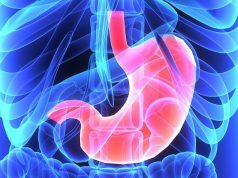The annual Digestive Disease Week, sponsored by the American Association for the Study of Liver Diseases, American Gastroenterological Association, American Society for Gastrointestinal Endoscopy, and Society for Surgery of the Alimentary Tract, was held from May 18 to 21 in San Diego and attracted approximately 16,000 participants from around the world, including researchers and academics in the fields of gastroenterology, hepatology, endoscopy, and gastrointestinal surgery.
In one study, Efi G. Kokkotou, Sc.D., Ph.D., M.D., of the Beth Israel Deaconess Medical Center in Boston, and colleagues evaluated the efficacy of a novel class of drugs, n-acylethanolamine-hydrolyzing acid amidase (NAAA) inhibitors, in the treatment of inflammatory bowel disease (IBD).
“In this study, we screened among seven different candidate drugs, all of which target NAAA,” Kokkotou said. “NAAA is an enzyme that inactivates certain endogenous bioactive lipids that have anti-inflammatory properties, the levels of which are increased upon NAAA inhibition.”
In order to find the most efficacious drug, the investigators used mice with disease similar to IBD in humans.
“While studies in mice are important, findings in mice don’t always reflect outcomes in humans. The lead candidate was subsequently evaluated using a therapeutic responses predictor assay. The assay is based on treating dish samples (intestinal mucosal biopsies) derived from patients with IBD instead of administering the drug directly to the patient,” Kokkotou said. “When evaluating drug efficacy, there is a good correlation between the treatment outside the body (ex vivo) and in vivo.”
The investigators found that the samples from IBD patients had a high rate of response to the leading candidate drug selected based on the mouse studies.
“Keeping in mind that these studies are still preliminary and need to be confirmed in a larger number of patients, overall responses to this new drug appear to be more frequent and broader compared to treatment with anti-tumor necrosis factors using the same assay,” Kokkotou said. “While these observations are encouraging, in particular because we were able to identify a new class of drugs with a therapeutic promise for IBD, further studies evaluating drug safety and tolerability are required before moving on to clinical trials.”
In another study, Miquell Olivia Miller, M.D., of Stanford University in California, and colleagues evaluated cultural competence among providers of colorectal cancer care. The investigators conducted a validated survey that measured the cultural competency of providers in a tertiary cancer center, the scores of which were matched with publicly available Press Ganey patient satisfaction scores.
“This satisfaction survey is widely used by many hospitals. We found that patient satisfaction was significantly associated with providers that had high levels of culturally competent behaviors,” Miller said. “These preliminary findings indicate that cultural competence of providers is valued by patients because they are more satisfied with those providers. We also believe providers can benefit from cultural competence training to improve patient satisfaction if training is focused on behaviors and skills.”
Tracey G. Simon, M.D., of Massachusetts General Hospital and Harvard Medical School in Boston, and colleagues evaluated physical activity in two large prospective studies of over 113,000 U.S. women and men without known liver disease at enrollment. The investigators performed a 26-year follow-up and evaluated risk factors such as diet, exercise, lifestyle, clinical comorbidities, and alcohol use.
“We found that higher levels of physical activity, measured 26 years before any outcome, significantly reduce the risk from dying of chronic liver disease,” Simon said. “Currently, there are no specific guidelines for the optimal type or intensity of exercise to prevent liver-related mortality. This is very important because, in the United States, liver-related mortality is increasing at an alarming rate.”
In this study, the investigators observed a similar magnitude of benefit when they compared moderate and vigorous aerobic activity. Specifically, the investigators found that regular, moderate activity, including walking at an average pace, significantly reduced risk of mortality from chronic liver disease.
“This is important because walking is the most common form of physical activity among American adults, and it is safe and easily adoptable. Our findings show that walking for four or more hours per week may contribute to a 63 percent reduction in risk of liver-related death,” Simon said. “Our findings demonstrate that physical activity is a major modifiable predictor of liver-related mortality, and engaging in weekly walking activity may reduce the risk of liver-related death in later life.”
DDW: Ingested Button Battery Can Cause Gastric Injury
MONDAY, May 20, 2019 (HealthDay News) — Ingestion of a button battery can cause mucosal damage in pediatric patients, even without symptoms, according to a study presented at the 2019 Digestive Disease Week, held from May 18 to 21 in San Diego.
Press Release
More Information
DDW: Parkinson Disease Risk Up After Appendectomy
MONDAY, May 13, 2019 (HealthDay News) — The risk for Parkinson disease is increased after appendectomy, according to a study presented at the 2019 Digestive Disease Week, held from May 18 to 21 in San Diego.
Press Release
More Information
DDW: Lasting Weight Loss Seen With Endoscopic Sleeve Gastroplasty
FRIDAY, May 10, 2019 (HealthDay News) — Endoscopic sleeve gastroplasty is associated with significant total body weight loss over five years, according to a study presented at the 2019 Digestive Disease Week, held from May 18 to 21 in San Diego.
Press Release
More Information
Copyright © 2019 HealthDay. All rights reserved.







